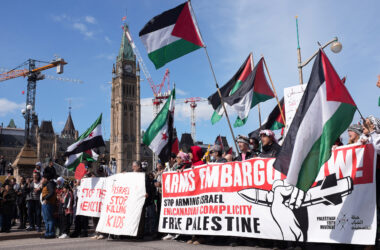On March 12, McGill students, staff, faculty, and other community members assembled to discuss the issues surrounding the events of Nov. 10, in Christopher Manfredi’s (Dean of Arts) second Open Forum meeting. Around 30 people attended the event, including Principal Heather Munroe-Blum and Provost Anthony Masi.
Mandated by Munroe-Blum, the Open Forum is in response to Dean of Law Daniel Jutras’ report on the events of Nov. 10. In his report, Jutras recommended the creation of an Open Forum to discuss “the meaning and scope of the rights of free expression and peaceful assembly on campus.”
Attendees were quick to point out the difficulty of defining terms like “peaceful,” but came up with several suggestions for McGill’s treatment of space on campus. One student recommended that McGill create designated spaces on campus grounds for both protests and counter-protests, while another suggested designating spaces where people can’t protest, as opposed to space where they can.
“[These would be] two places where people are not going to be protesting, [and] where people would know [they] can walk onto campus here and not cross a picket line,” Adam Bouchard, second-year masters student, said. “Instead of saying ‘You’re free to do anything you want here,’ say ‘Be anywhere but right there.'”
Other students, however, expressed concern over the idea that the university may designate specific space on campus for protesting or not protesting.
“I think it might succeed in separating out the more moderate folks from the people who really want to butt heads with authority, but I’m not sure that that’s helpful and I’m not sure that’s going to keep in spirit with the university,” SSMU President Maggie Knight said.
Concerns about university limitations on the location of protests brought up broader concerns about the role of the university in shaping student life.
“Our university has a proper function … of training future critical citizens, [so] we should always err on the side of free speech,” Lorenz Luthi, an associate professor in the department of history, said.
Students also expressed concern with the way the administration handled past and current discussions with students.
“Often students feel like they are either used as a marketing campaign or they are not really advocated for in terms of the university,” SSMU VP University Affairs Emily Yee Clare said. “We’re viewed as being people that need to be controlled instead of students that [the administration] can work together with.”
“[At this forum] we’re talking about the university’s response to protests in general, but we haven’t talked about the response to the actual specific issues,” Haley Dinel, religious studies senator, said. “We’re addressing the way [students are] upset, but not necessarily the reasons why.”
According to some students, discussion on students’ rights to peaceful assembly and freedom of expression are especially important at this time of year, because the university may soon face similar challenges if students decide to join the Quebec-wide student strike against tuition fee increases.
“I think the university is going to have a very tall order on their hands, making sure that students can still make it to class if they’re choosing to not boycott or to strike [and] that students who are boycotting and striking have the opportunity and the place to be able to freely express themselves,” Bouchard said.
Masi said that the university is obligated to support students who wish to attend class during a student strike, but does not have measures in place to support students who choose to strike.
“It’s a student’s right to decide how he or she chooses to act in the face of an organized protest,” he said. “They have a right to protest [and] they can exercise that right … [but] there’s no obligation on the part of the professor to accommodate a student who chooses to go out on strike … the professor has to make that choice.”
After the forum, Manfredi said he will consider the various student suggestions on how to better advertise the forum, but is generally happy with the diversity of community members attending the meetings.
“We’ve been getting a good variety of members of the university community here,” he said. “It’s the variety of voices that’s important, the fact that we’re getting in one room—students, faculty, senior administrators, non-academic staff … That doesn’t happen very much at McGill and I think that’s a unique aspect of this process.”
Manfredi’s next Open Forum meeting will take place on March 27 at Macdonald Campus from 1:30-3:00 p.m.







